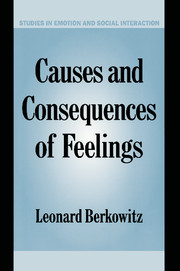Book contents
- Frontmatter
- Contents
- Acknowledgments
- Introduction
- Part I The Nature and Origin of Feelings
- 1 Feelings: Their Nature and Causes
- 2 More on the Causes of Feelings: Appraisals and Bodily Reactions
- Part II Feelings and Memory
- Part III Affective Influences on Cognitive Processes
- Part IV Influencing Action
- Notes
- References
- Index
- Titles in the Series
2 - More on the Causes of Feelings: Appraisals and Bodily Reactions
Published online by Cambridge University Press: 28 October 2009
- Frontmatter
- Contents
- Acknowledgments
- Introduction
- Part I The Nature and Origin of Feelings
- 1 Feelings: Their Nature and Causes
- 2 More on the Causes of Feelings: Appraisals and Bodily Reactions
- Part II Feelings and Memory
- Part III Affective Influences on Cognitive Processes
- Part IV Influencing Action
- Notes
- References
- Index
- Titles in the Series
Summary
After examining the nature of affective experiences, the previous chapter considered a number of factors that lead to these feelings. We can also think of the influences affecting emotional states in a broader way. Generally speaking, psychologists sometimes talk about two types of emotion theories: those that emphasize central processes, primarily involving cognitions, and the more peripherally oriented formulations giving much more attention to the role of bodily reactions. This chapter will look at both of these approaches to emotional experience. It will begin with an examination of several cognitively focused theoretical schemes indicating that people's understandings determine the specific nature of the feelings they have when they are emotionally aroused. Then the chapter will turn to the study of how certain skeletal-muscular reactions can influence specific feelings.
To illustrate the differences between these two different approaches, let's start with the passage from William James's pioneering 1890 book on psychology cited in the Introduction.
Common sense says, we lose our fortune, are sorry and weep; we meet a bear, are frightened and run; we are insulted by a rival, are angry and strike. The hypothesis here to be defended says that this order of sequence is incorrect … and that the more rational statement is that we feel sorry because we cry, angry because we strike, afraid because we tremble. … Without the bodily states following on the perception, the latter would be purely cognitive in form, pale, colorless, destitute of emotional warmth. We might then see the bear, and judge it best to run, receive the insult and deem it right to strike, but we should not actually feel afraid or angry.
- Type
- Chapter
- Information
- Causes and Consequences of Feelings , pp. 38 - 64Publisher: Cambridge University PressPrint publication year: 2000



